
WHERE CHIANG KAI-SHEK LOST CHINA
TWENTIETH-CENTURY BATTLES
Spencer C. Tucker, editor
Balkan Breakthrough
RICHARD C. HALL
The Battle for Manchuria and the Fate of China: Siping, 1946
HAROLD TANNER
Battle of Dogger Bank: The First Dreadnought Engagement, January 1915
TOBIAS R. PHILBIN
The Battle for Western Europe, Fall 1944: An Operational Assessment
JOHN A. ADAMS
The Battle of An Loc
JAMES H. WILLBANKS
The Battle of Heligoland Bight
ERIC W. OSBORNE
The Battle of Leyte Gulf: The Last Fleet Action
H. P. WILLMOTT
The Battle of the Otranto Straits: Controlling the Gateway to the Adriatic in World War I
PAUL G. HALPERN
Battle of Surigao Strait
ANTHONY P. TULLY
The Brusilov Offensive
TIMOTHY C. DOWLING
Chinas Battle for Korea
XIAOBING LI
D-Day in the Pacific: The Battle of Saipan
HAROLD J. GOLDBERG
The Dieppe Raid: The Story of the Disastrous 1942 Expedition
ROBIN NEILLANDS
The Imjin and Kapyong Battles: Korea, 1951
PAUL MACKENZIE
In Passage Perilous: Malta and the Convoy Battles of June 1942
VINCENT P. OHARA
Midway Inquest: Why the Japanese Lost the Battle of Midway
DALLAS WOODBURY ISOM
Operation Albion: The German Conquest of the Baltic Islands
MICHAEL B. BARRETT
Prelude to Blitzkrieg: The 1916 Austro-German Campaign in Romania
MICHAEL B. BARRETT
The Second Battle of the Marne
MICHAEL S. NEIBERG
The Siege of Kut-al-Amara: At War in Mesopotamia, 19151916
NIKOLAS GARDNER
WHERE
CHIANG KAI-SHEK
LOST CHINA

THE LIAO-SHEN CAMPAIGN, 1948
HAROLD M. TANNER

This book is a publication of
INDIANA UNIVERSITY PRESS
Office of Scholarly Publishing
Herman B Wells Library 350
1320 East 10th Street
Bloomington, Indiana 47405 USA
iupress.indiana.edu
2015 by Harold M. Tanner
All rights reserved
No part of this book may be reproduced or utilized in any form or by any means, electronic or mechanical, including photocopying and recording, or by any information storage and retrieval system, without permission in writing from the publisher. The Association of American University Presses Resolution on Permissions constitutes the only exception to this prohibition.
 The paper used in this publication meets the minimum requirements of the American National Standard for Information SciencesPermanence of Paper for Printed Library Materials, ANSI Z39.481992.
The paper used in this publication meets the minimum requirements of the American National Standard for Information SciencesPermanence of Paper for Printed Library Materials, ANSI Z39.481992.
Manufactured in the United States of America
Library of Congress Cataloging-in-Publication Data
Tanner, Harold Miles.
Where Chiang Kai-Shek lost China : the Liao-Shen campaign, 1948 / Harold M. Tanner.
pages cm. (Twentieth-century battles)
Includes bibliographical references and index.
ISBN 978-0-253-01692-8 (cloth : alkaline paper) ISBN 978-0-253-01699-7 (ebook) 1. ChinaHistoryCivil War, 1945-1949CampaignsChinaLiaoning Sheng. 2. ChinaHistoryCivil War, 1945-1949CampaignsChinaManchuria. 3. Liaoning Sheng (China)History, Military20th century. 4. Manchuria (China)History, Military20th century. I. Title.
DS777.5425.L5T36 2015
951.042dc23
2015016683
1 2 3 4 5 20 19 18 17 16 15
For
WILLIAM
Contents
Acknowledgments
One of the great pleasures of historical research is that the necessary materials are not available online. Consequently, researching and writing a book of this nature has given me the opportunity to travel widely, to connect with old and new friends, and to accumulate a long list of debts to be acknowledged. I owe a particular debt of gratitude to Professor Liu Tong of Shanghai Jiaotong University for sharing his insights and for directing me toward materials without which this book could not have been written. In Beijing, Wang Chaoguang of the Chinese Academy of Social Sciences Institute of Modern History has been generous with his advice and with arranging the institutional support necessary when doing research in China. He Jiangfeng contributed his enthusiasm and knowledge of sources in Republican-era history as a research assistant in Beijing. Dr. Li Chen of Renmin University kindly shared his insights on the civil war along with a copy of his doctoral dissertation. Chen Yung-fa, Chang Jui-te, and the Institute of Modern History at Academia Sinica in Taipei provided assistance and a comfortable base for research in Taiwan. Professor Sherman Lai at the University of Manitoba has kindly shared his advice and insights into the culture of the Peoples Liberation Army. Also in Canada, Sr. Huguette Turcotte, of the Missionary Sisters of the Immaculate Conception, kindly supplied me with material from the archives and publications of the M.I.C. I would also like to express my appreciation to an anonymous reader for his or her suggestions, to Spencer Tucker, editor of the Twentieth-Century Battles series and to editorial director Robert Sloan of the Indiana University Press.
I conducted research at the following libraries and archives: in China, the National Library in Beijing, the Jinzhou Municipal Archives, the Liaoning Provincial Library, and the Liao-Shen Campaign Memorial Hall; in the United States, the National Archives and Records Administration in College Park, Maryland, the Asian Reading Room of the Library of Congress, the Research Library of the George C. Marshall Foundation, the Hoover Archives, Stanford Universitys East Asia Library, and the University of North Texas Libraries. All this travel and more was made possible thanks to the generous financial support that I have received from all levels of the University of North Texas: the Department of History and its Military History Center, the College of Arts and Sciences, and the Office of the Provost, and also from the Hoover Institution and Archives for participation in the summer 2013 workshop Revisiting Modern China at the Hoover Archives. My department chair, Dr. Richard B. McCaslin has been consistently supportive of all faculty research, including my own, and made funds available to pay Professor Alexander Mendoza for drawing the maps for this book. Finally, my deepest thanks, as always, go to my wife, Yiyun, and our children, Sophia and William, for providing the foundations and the meaning for whatever professional success I may have achieved.
A Note on Chinese Names
In the main text, Chinese names have been written in the pinyin Romanization system. Most words are pronounced roughly the way an English-speaker would guess. There are a few important exceptions to this rule: c is pronounced as ts, q as ch, and x more or less like s. I have used non-pinyin spellings for the names of a few individuals and entities whose names have become universally recognized under those earlier spellings. For example, Chiang Kai-shek (pinyin Jiang Jieshi), Chiang Ching-kuo (pinyin Jiang Jingguo), Soong May-ling (pinyin Song Meiling) and T. V. Soong (pinyin Song Ziwen).
Next page

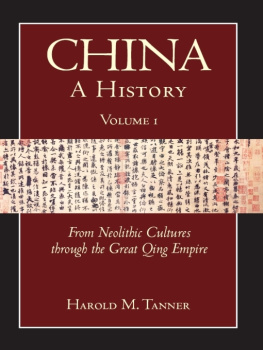

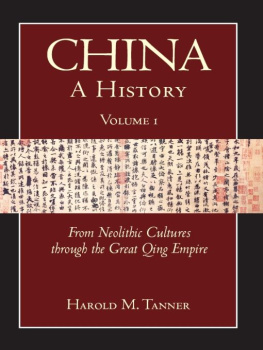



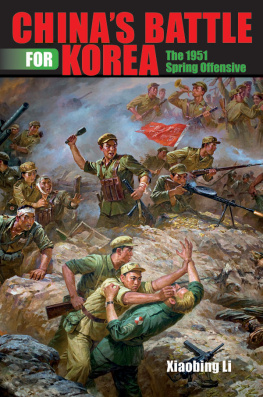

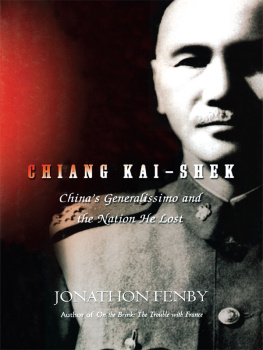
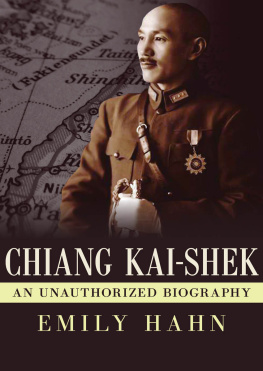
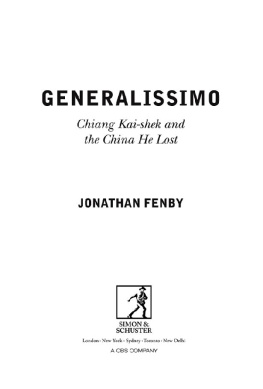



 The paper used in this publication meets the minimum requirements of the American National Standard for Information SciencesPermanence of Paper for Printed Library Materials, ANSI Z39.481992.
The paper used in this publication meets the minimum requirements of the American National Standard for Information SciencesPermanence of Paper for Printed Library Materials, ANSI Z39.481992.